by Ray Linville
When you eat in a restaurant, do you think about the farms that provide your meal? An excellent way to visit the source of your food is the annual farm tours conducted in our state.
Earlier this year I explored several farms as part of the Piedmont Farm Tour, held on the final weekend every April by the Carolina Farm Stewardship Association. This tour is one of two in North Carolina – the other is the Eastern Triangle Farm Tour – and one of four that the association sponsors. One farm – the Captain J.S. Pope Farm — in particular is intriguing.
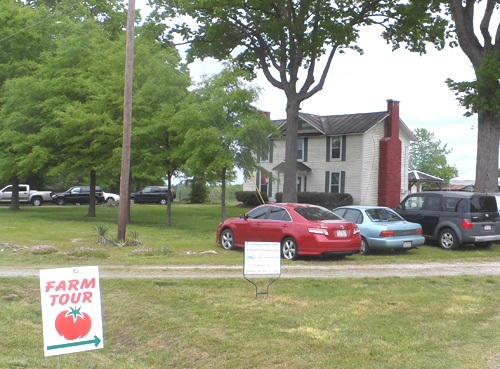
which includes the 150-year-old farmhouse in the background.
The farm is located in Cedar Grove, a small rural community in northern Orange County. The farm, an Orange County Historic Landmark (and one of only six properties so designated), was placed on the National Register of Historic Places in May and has been in the same family for more than 200 years. In addition to the historic designation, the Pope family is equally proud that a pond on the farm is a source of the Eno River, which joins the Flat River to become the Neuse, the longest river entirely in North Carolina, that flows into Pamlico Sound near New Bern.
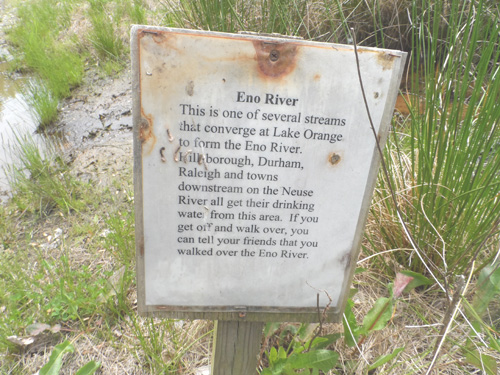
The farm is named for John S. Pope, who in 1856 married Mary Jane McDade, daughter of the owner at the time. Her dowry included the part of her family’s property that became the Pope Farm. Farming was interrupted by the Civil War and Pope’s enlistment in Company E, 31st North Carolina Infantry, in 1861. He succeeded in rising to the rank of captain as well as surviving the grueling battles. After the war, he returned home to farm until his death in 1895.

is prominently displayed on a mantle in the farmhouse.
The land had been bought in 1806 by the great, great grandfather of Bob Pope, the current owner. For the first 150 years the main money crop was tobacco (although the farm also grew corn for making moonshine). The remarkable achievement of the farm is not only the long-standing family ownership but the successful conversion of the property from tobacco to lamb production. In fact, lamb from the farm is on the menu of several leading N.C. restaurants, such as 18 Seaboard in Raleigh, Kitchen in Chapel Hill, and Four Square Restaurant in Durham.
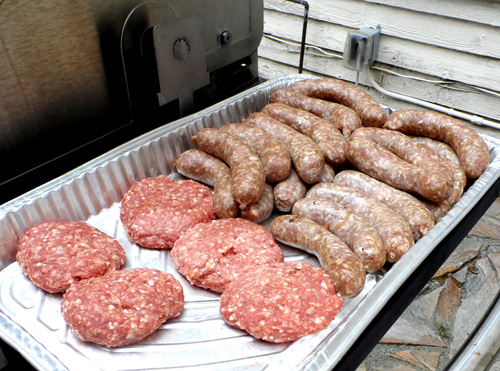
Lamb burgers and brats provide a tempting lunch.
The farm is known throughout the state for producing high quality lamb in a manner that does not compromise the environment. The lambs eat only grass (no corn or other grain), and the farm uses no hormones, antibiotics, pesticides, or herbicides. Remnants of the old tobacco production are still visible. In fact, the lambs use the former tobacco drying sheds for shelter.
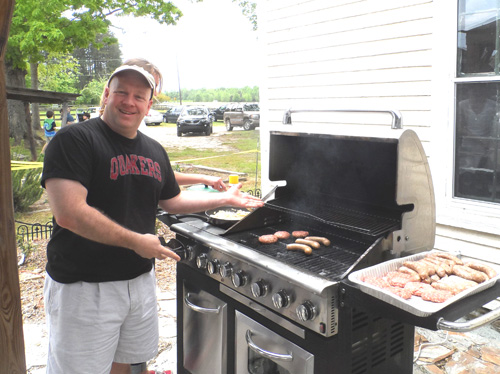
Three llamas — Samantha, Fawn and Patrina – guard the lambs and are much more reliable than the dogs once used to protect the herd as they graze. Samantha is the star among this group because she is computer savvy and fully literate with the latest social media. Her own Twitter account (@peevishllama) provides updates about the farm to her followers.
Visiting a farm that serves restaurants can be a meaningful experience, particularly when it is as effectively organized as the Piedmont Farm Tour, the largest sustainable farm tour in the country. Although 39 farms in five neighboring counties – Orange, Person, Durham, Chatham, and Alamance — were on the tour, only three or four farms can realistically be visited each day. However, by participating on the tour, an average citizen learns what goes on at a sustainable small farm.
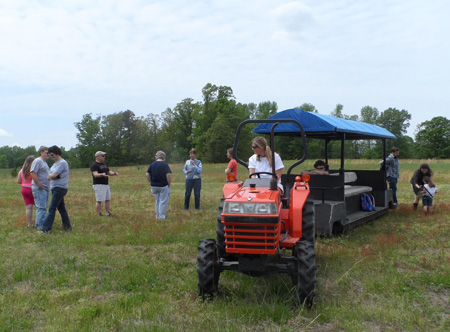
The Carolina Farm Stewardship Association, the oldest and largest sustainable agriculture organization in the Southeast, provides a very valuable service. By encouraging residents in the Carolinas to grow and eat local, organic foods, it is also educating the community about local agriculture and identifying support that family farms need to be successful.
RESOURCES
Carolina Farm Stewardship Association
_________________________________
Ray Linville is an associate professor of English and humanities at Sandhills Community College in Pinehurst, NC, and serves on the board of the N.C. Folklore Society. Read more about Ray’s ramblings at his blog: Sights, Sounds and Tastes of the American South.
Leave a Reply